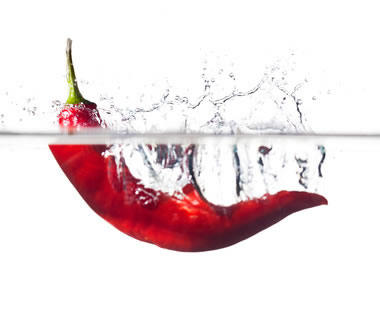Capsaicin (chemical formula C18H27NO3) is the major chemical that makes chili peppers hot. This compound works on pain by binding to the VR 1 receptors and stripping nerves of substance P, a pain-signaling neurotransmitter. Capsaicin is a compound which stimulates chemoreceptor nerve endings in the skin, particularly the mucous membranes. When a capsaicin ointment or cream used on the skin, helps relieve pain.
Capsaicin Benefits
Capsaicin cream and ointments are used externally to treat pain from osteoarthritis, shingles and the skin sensations  from pruritus. It is available as a cream in two diverse strengths 0.075% and 0.025%. The stronger cream (Axsain) is licensed for use in postherpetic neuralgia – to be applied after the rash has healed – and painful diabetic neuropathy. The weaker-cream (Zacin) is licensed for use in the symptomatic relaxation of osteoarthritis.
from pruritus. It is available as a cream in two diverse strengths 0.075% and 0.025%. The stronger cream (Axsain) is licensed for use in postherpetic neuralgia – to be applied after the rash has healed – and painful diabetic neuropathy. The weaker-cream (Zacin) is licensed for use in the symptomatic relaxation of osteoarthritis.
• Substance P
Capsaicin are felt to help deplete substance P from local nerve endings and relieve pain. Substance P is an significant factor in pain perception. Capsaicin is thought to reduce pain sensation by temporarily depleting a neurotransmitter, substance P (also known as SP), which relays pain signals to the brain. At first actually, the release of substance P causes pain, but eventually the nerve terminals become depleted of substance P, leading to loss of the pain sensation. Effectual use of capsaicin requires topical use 4 or 5 times daily for a period of at least four weeks.
• Capsaicin and Arthritis
Researches have shown that capsaicin can relieve arthritis symptoms and improve flexibility of the joints. Capsaicin has very strong pain-relieving effects when applied to the skin. A study reported in Clinical Therapeutics in 1991 involved 31 rheumatoid arthritis and 70 osteoarthritis patients. Participants were instructed to apply 0.025% capsaicin or placebo to painful knees, 4 times a day. Findings revealed that 80 percent of patients treated with capsaicin experienced pain reduction following 2 weeks of therapy.
• Psoriasis
Psora is a skin illness that affects different areas of the body, including the scalp, knees and elbows. A double-blind evaluation; of topical capsaicin in pruritic psoriasis showed that people with psora who took capsaicin cream had reduced itching, scaling, redness compared with individuals who used a placebo.
• Post-Herpetic Neuralgia
Postherpetic neuralgia is a nerve pain that persists after a shingles rash has cleared. Neuralgia is a term that describes nerve pain. The pain is generally a constant, burning, or gnawing pain. A capsaicin product, approved by the Food and Drug Administration, is available for the cure of post-herpetic neuralgia. A study reported in Clinical Therapeutics demonstrated important development in pain from shingles or postherpetic neuralgia in 86% patient treated with capsaicin for up to 2 years.
• Diabetic Neuropathy
Diabetic neuropathy is a debilitating disorder that occurs in approximately 50 % of patients with diabetes. Excessive blood sugar can harm nerve fibers throughout your body, however diabetic neuropathy most often damages nerves in your feet and legs. A 1991 study concluded that capsaicin cream reduced the level of pain caused by diabetic neuropathy. A meta-analysis of 4 randomized, double-blind, placebo-controlled trials of capsaicin in diabetic neuropathy found capsaicin to be more effective than placebo. But, capsaicin’s performance in relieving pain from diabetic neuropathy is extremely variable. Sometimes it makes the pain worse. If you have painful diabetic neuropathy, it is a good idea to consult physician before.
• Cancer
There have been different clinical trials conducted in China and Japan that shows natural capsaicin directly inhibits the growth of leukemic cells. Capsaicin avoids the replication of prostate cancer cells, according to a 2006 research reported in Cancer Research. Other study carried out at the “University of Nottingham” suggests capsaicin is able to trigger apoptosis in human lung cancer cells.
Leave a Reply